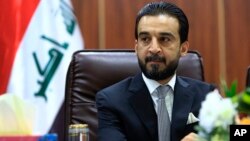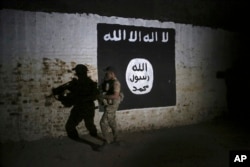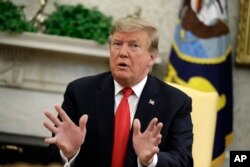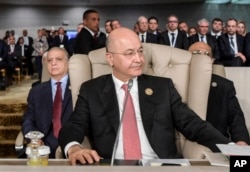In an exclusive interview with the Voice of America's Kurdish Service, Mohammed al-Halbousi, Iraq's speaker of the Council of Representatives, said support of the U.S.-led coalition to ensure a lasting defeat of Islamic State (IS) is crucial as Iraq continues its efforts against the group's insurgency activities.
Discussing whether neighboring Iran can meddle in Iraqi politics by pushing for the withdrawal of U.S. troops after the military defeat of IS, al-Halbousi said Iraq does not wish to be a proxy of any country, adding that the "overwhelming majority" in the Iraqi government supports the presence of the coalition forces.
"No guardianship on Iraq," al-Halbousi said, adding, "Any country can express its objection if it deems this presence will have a negative impact on it, but Iraq makes its own decisions."
The presence of U.S. troops in Iraq is the "single goal" of defeating IS and its radical ideology, al-Halbousi said.
"We do not allow Iraqi soil to be used against any neighbor," he said, but "we do not accept a country to impose its will on Iraq regarding Iraqi agreements with the international coalition, United States, or any other country."
Insurgency
The Iraqi government declared final victory over IS in December 2017, three years after the militant group seized about a third of the country's territory. The group has since gone underground, maintaining insurgency attacks against security forces and operating in small groups outside various cities.
Al-Halbousi said the next step for Iraq is to focus mainly on intelligence sharing, combating insurgency tactics and reconstructing areas destroyed by war. He said international cooperation is also vital to help Iraq deal with IS family members and captured foreign fighters.
"Iraq will prevail and move beyond those challenges with or without international support, but the time will be much longer if we do not have cooperation with regional and international powers," he said.
U.S. forces left Iraq in 2011, but returned after IS gained prominence in 2014. There are currently around 5,200 American troops stationed in Iraq, mostly at the Ain Assad Airbase in Al Anbar Province. U.S. military officials say their mission is to advise, assist and support Iraqi forces in the fight against IS.
Countering Iran
President Donald Trump has said U.S. troops will remain in Iraq to counter Iran's threats.
In an interview with CBS News in February, Trump said U.S. troops withdrawing from neighboring Syria would soon be moved to Ain Assad Airbase to keep an eye on Iran, which his administration has accused of being the world's leading state sponsor of terrorism and of wanting to acquire nuclear weapons.
"We spent a fortune on building this incredible base. We might as well keep it," he said. "And one of the reasons I want to keep it is because I want to be looking a little bit at Iran because Iran is a real problem."
For their part, Iranian officials say they could use their deepening influence in Iraq to defy U.S. pressures, particularly after the U.S.'s withdrawal from the 2015 nuclear deal.
"At a time when the United States is seeking to pressure the Iranian nation with its unjust sanctions, we need to develop and deepen our relations to stand against them," said Iranian President Hassan Rouhani during a visit to Iraq last month.
Iraqi officials have publicly expressed frustration over the U.S.-Iran competition in Iraq, fearing the rivalry could weaken Iraqi sovereignty and its ability to get back on its feet after IS's defeat.
"Don't overburden Iraq with your own issues," Iraq President Barham Saleh said in February, appealing to the U.S. and Iran to keep their conflict away from Iraq.
Al-Halbousi charged that officials in Baghdad wish to maintain a balanced relation with the U.S. and Iran to best serve Iraqi interests. He said good relations with Iran are equally indispensable to Iraq due to long historic ties and border sharing.
"Iran is a neighbor. They undeniably played an important role in helping Iraq against terrorism by providing support to Iraqi security forces. There are also religious ties between the people of Iraq and Iran. We wish our relationship to continue as neighbors, based on mutual respect," he said.



